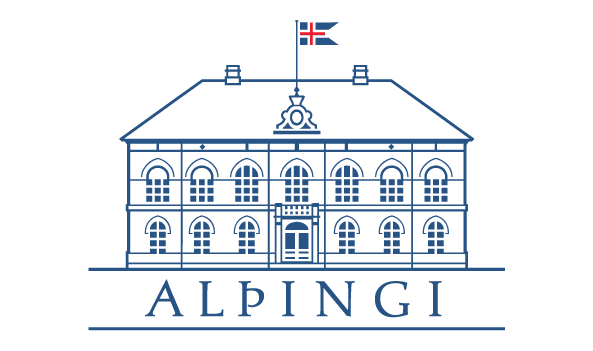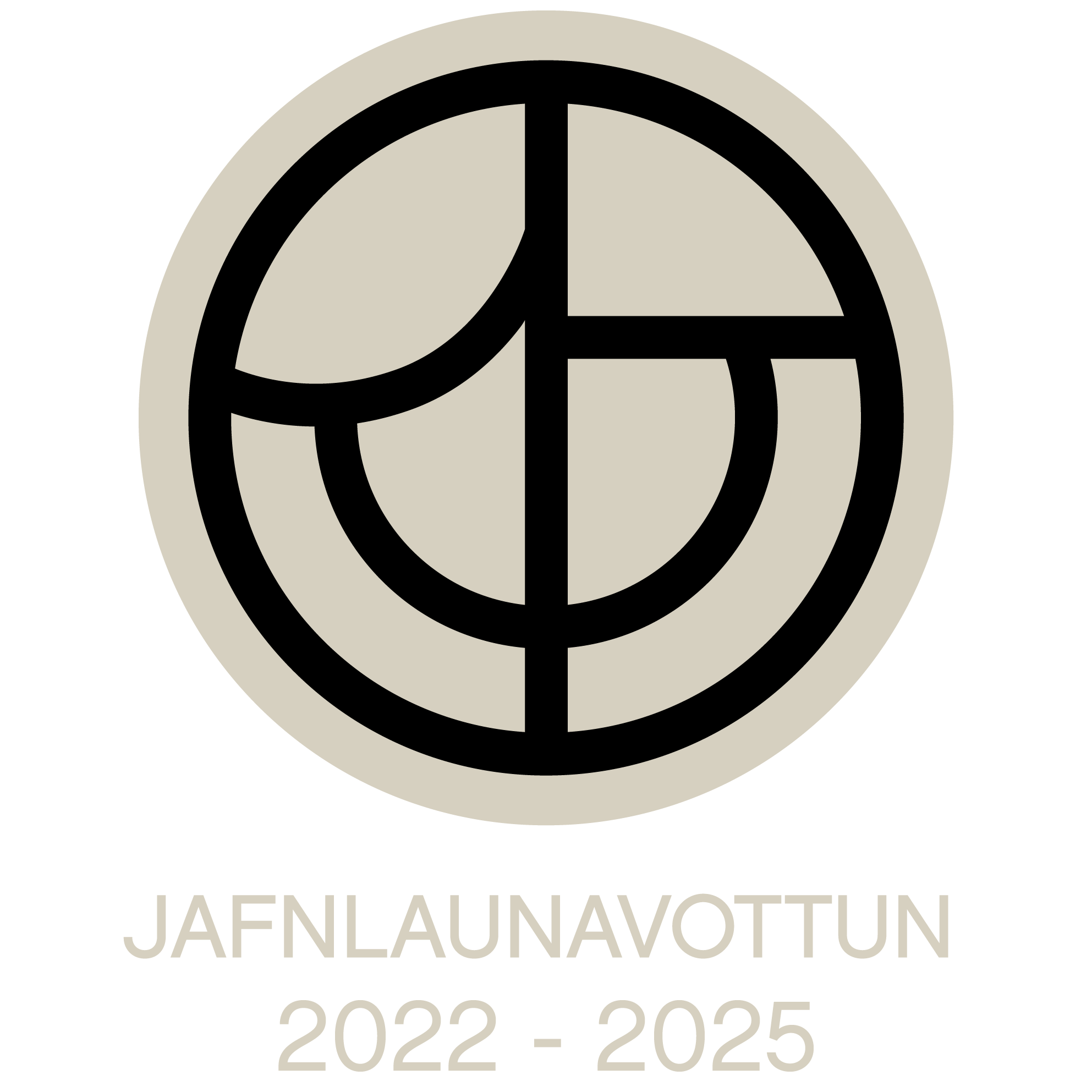Strategy and Action Plan against Bullying, Sexual and Gender-based Harassment and other Demeaning Conduct where Members of the Althingi are Involved
OBJECTIVES
Members of the Althingi will make every effort to show respect for each other regardless of opinions and background. The Althingi is also the workplace of the Althingi's staff, and other persons also have business there. The Althingi must work systematically to ensure that there is no tolerance for bullying, sexual and gender-based harassment and other demeaning conduct of any type or in any form.
As elected representatives of the nation, members of the Althingi will make every effort to create a healthy work environment, both inside and outside parliament, and wherever the members carry out their duties, rejecting all forms of bullying, sexual and gender-based harassment and other demeaning conduct. Members of the Althingi will not subject other members, the staff of the Althingi or visitors to such behaviour, cf. subparagraph d of the first paragraph of Art. 5 and Art. 8 of the Code of Conduct for members of the Althingi.
This plan is adopted on the basis of Art. 88 of the Act on the Standing Orders of the Althingi, cf. also Art. 8 of the same Act, and the Code of Conduct for Members of the Althingi, as referred to in Parliamentary Resolutions No. 23/145 of 2016 and No. 18/148 of 2018. The plan includes members of the Althingi during official activities in connection with their duties as nationally elected representatives, in their interactions with each other and in their interactions with the staff of the Althingi, including the staff of parliamentary groups, and when they are receiving guests, at meetings in the Althingi, when travelling or at events organized by or connected with the Althingi. The plan also covers online communication.
Parliamentary groups shall designate their chairperson or a confidant who will be responsible for responding to notifications and indications of bullying, sexual and gender-based harassment and other demeaning conduct as provided for in this plan. Parliamentary group delegates are under the same obligations as the chairpersons under this plan. Information about the group's designated delegate must be published on the Althingi website.
The Speaker of the Althingi and the Secretary General of the Althingi, acting on the former's behalf, shall direct the implementation and follow-up of the Strategy and Action Plan against Bullying, Sexual and Gender-based Harassment and other Demeaning Conduct where members of the Althingi are involved.
PREVENTION AND PREVENTIVE ACTIONS
All members of the Althingi will endeavour to create a healthy and safe working environment in the Althingi, rejecting all forms of bullying, sexual and gender-based harassment and other demeaning conduct.
- The members of the Althingi will endeavour to create a working environment in which they and persons with whom they communicate can carry out their duties and undertakings without the risk of being subjected to bullying, sexual or gender-based harassment or other demeaning conduct.
- Working conditions must minimize the risk of bullying, sexual and gender-based harassment and other demeaning conduct. Particular attention should be paid to conditions in common areas. Specific effort shall be made to reduce the risk of situations arising that could lead to bullying, sexual and gender-based harassment and other demeaning conduct in the Althingi. The Secretary General of the Althingi ensures that a risk assessment is regularly carried out of the Althingi as a workplace, as provided for in Art. 4 of Regulation No. 1009/2015, on actions against bullying, sexual harassment, gender-based harassment and violence in the workplace, and that a plan is drawn up in accordance with the results of the assessment.
- The Secretariat of the Althingi shall send this plan to all members of the Althingi for their information at the beginning of each electoral term, when the newly elected parliament convenes. The chairpersons of the parliamentary groups are responsible for having the plan presented to their parliamentary groups. It shall also be specifically introduced to new members of the Althingi and deputy members when they take their seat in the Althingi. The Secretary General of the Althingi is responsible for ensuring the plan is presented to the staff of the Althingi and reviewed regularly at staff meetings. The plan shall be available on the Althingi website.
- The Speaker of the Althingi shall ensure that members of the Althingi receive regular education on bullying, sexual and gender-based harassment and other demeaning conduct, the characteristics of a positive workplace culture and the objectives of this plan. Such education shall place special emphasis on making members of the Althingi aware of the different positions of the elected representatives and the staff of the Althingi. The basic values that must be respected in communication in the Althingi should also be discussed, in order to foster a work environment where bullying, harassment and demeaning conduct are not tolerated.
- The Speaker of the Althingi must ensure that the chairpersons of the parliamentary groups, delegates referred to in this plan, the Secretary General of the Althingi and other managers are provided with training in receiving notifications and education on the work processes and the remedies that the plan involves, to enable them to provide the necessary support.
- The Speaker of the Althingi shall ensure that, when requested, advice is available on individual issues relating to the content and implementation of the plan from experts with relevant education and experience.
- The Speaker of the Althingi shall regularly have a survey made of attitudes to the work environment and workplace culture in the Althingi, placing special emphasis on bullying and sexual and gender-based harassment, in order to analyse the extent of such behaviour and take any necessary measures, such as through further promotion of this plan.
PROCEDURES AND HANDLING OF CASES
The main purpose of proceedings under this Action Plan is to reveal whether the behaviour of a member of the Althingi comprises bullying, sexual or gender-based harassment or other demeaning conduct and to take appropriate measures.
In light of the fact that members of the Althingi cannot be subjected to work-related sanctions, restriction of rights of any kind or coercion to force them to participate in proceedings, individual cases will be resolved through conversations, the assistance of experts as appropriate, and an agreement on resolution and follow-up. At the same time, caution will be exercised and consideration given to the well-being and wishes of the complainants.
The following procedures will serve as guidelines in processing notifications. The list is not exhaustive. These are general criteria that should be considered, taking into account the circumstances in each case.
I. Informal procedure (“air a case”)
The purpose of the informal procedure is to give the individual the opportunity to discuss their experience in a safe environment, regardless of whether or not a formal notification will be submitted.
The informal procedure is intended to provide the individual with information from the response party on what the definition of bullying, sexual or gender-based harassment and other demeaning conduct covers, what is included in the procedure and processing of notifications, what parties will be involved in such work and more, cf. Sections II and III. Following the informal procedure, an informed decision can be made as to whether the person concerned wishes to continue with the case and with the support they choose or need. If the case involves only an informal procedure or if the involvement of others is requested without a formal notification being submitted, the person concerned is offered assistance and advice.
II. Incidents between members of the Althingi and incidents between members of the Althingi and the staff of the Althingi or visitors
- Notification
- A member of the Althingi who believes they have been subjected to bullying, sexual or gender-based harassment or other demeaning conduct can submit a notification to the chairperson of their parliamentary group or other confidant that the group has designated or to the Secretary General of the Althingi.
- A non-party member of the Althingi can submit a notification to their confidant, who will forward it or contact the Secretary General of the Althingi directly.
- The staff of the Althingi, including parliamentary group staff, can submit their notification to their immediate superior, who will forward it to the Secretary General of the Althingi, or contact the Secretary General of the Althingi directly.
- Visitors and others with whom members of the Althingi interact in the course of their parliamentary activities can submit a notification to the Secretary General of the Althingi.
- Response
- Notifications must be acted upon promptly. The recipient of the notification must inform the Speaker of the Althingi, the Secretary General of the Althingi, and the chairperson of the parliamentary group or the confidant of the respondent about it.
- Under the General Penal Code, certain conduct covered by the Action Plan, or such attempted conduct, may be criminally culpable, e.g. in the case of sexual offences, including sexual harassment, or physical injury, deprivation of freedom or threats of violence. If the recipients receive a serious notification, where there is a suspicion that a criminal offence may be involved, the complainant must be informed on how to file a complaint with the police. During a police investigation, it may be necessary to take measures at the workplace, for example, limiting contact or making changes to the work area and offering counselling and other support as appropriate. If the complainant decides not to file a complaint with the police but requests that the issue be handled as provided for under the Action Plan, the process shall continue. Similarly, the complainant may request that the process according to the Action Plan continue while the handling of the complaint is underway, provided that the interests of the investigation are not jeopardised.
- Advice, support and mediation
- The parties to the case shall be offered expert advice provided by the Althingi, together or individually.
- The advisor must assess the situation, obtain information from those who may have knowledge of the incident and other data as needed and prepare the recording of the incident description. If an incident falls under the scope of the Action Plan, the parties will be offered mediation under the direction of the advisor. Mediation examines whether it is possible to reach an agreement on appropriate actions, such as the termination of specific behaviour, if it is still occurring, preventing its recurrence and ensuring that workplace conditions do not pose a continuing risk of such behaviour. Actions can include guidance for persons at whom the notification is directed, restriction of communication between the parties or changes in the organisation of work, such as conducting parliamentary work so that the parties need only have minimal communication. Even if there is no mediation, the complainant must be offered counselling and other support as appropriate.
- The advisor must inform the Speaker and Secretary General of the Althingi of the status of the case and the progress of mediation.
- Mediation can lead to an agreement on the conclusion of a case.
- Conversation between the complainant and the respondent together with senior managers and parliamentary group chairpersons
- If mediation proves to be ineffective or if it is not attempted, the Speaker and Secretary General of the Althingi, together with the relevant chairpersons of the parliamentary groups or confidants, shall invite the complainant and the respondent to a meeting where solutions are sought.
- It is the responsibility of the Speaker and the Secretary General of the Althingi to ascertain whether the complainant does not wish to meet with the person at whom the notification is directed.
- Agreement
- A case can end with an agreement on actions and their follow-up.
- Follow-up
- Follow-up can consist of support, changes within the workplace or work arrangements, or the monitoring of communication, mental well-being and progress, including in the form of conversations. If further follow-up is needed, such as consultation with a psychologist or other form of support or counselling, it will be made available.
- A time shall be fixed for assessment of the effectiveness of actions and need for further actions.
- Case referred to the Speakers' Committee for consideration under the Code of Conduct for Members of the Althingi
- If an agreement cannot be reached to conclude a case, as the case may be with the help of advisers and mediation, the Speaker of the Althingi, after obtaining the complainant's opinion, may refer the case to an official Code of Conduct procedure.
- Before taking such action, the Speaker of the Althingi shall inform the chairperson or delegate of the parliamentary group or of the non-party member of the Althingi.
- Conclusion of the case
- The response parties must ensure that when the case concludes the parties are informed of its outcome.
- Archiving
- In dealing with bullying and harassment cases as referred to in this plan, special attention must be paid to the archiving of all data, including visual material, e-mails, messages and meeting minutes.
- Advice of the Secretary General of the Althingi
- The Secretary General of the Althingi shall provide advice on the resolution of individual cases, arrange for the necessary assistance and guidance to complainants, offer mediation by external experts and ensure that case records are preserved.
III. Incidents between members of the same parliamentary group
A member of the Althingi who believes they have been subjected to bullying, sexual or gender-based harassment or other demeaning conduct by a member of the same parliamentary group can send a notification to the group chairperson or other delegate designated by the parliamentary group. The examination, procedure, conclusion and follow-up of such cases can comply with rules adopted by the parliamentary group if the complainant did not submit their notification as provided for in Section II. Advice and support for the complainant under the auspices of the Secretariat of the Althingi shall be available throughout the process.
IV. Confidentiality of response parties
In dealing with a case, care and consideration must be shown regarding the private affairs of the persons concerned. Parties are always permitted to have a confidant or an external expert accompany them in conversations about their case.
All handling of cases shall be subject to confidentiality. Case details will not be made public by the response parties. Case records must be securely archived. The parties may not disclose any documentation they receive under the Action Plan.
V. Handling of notifications directed to response parties
If a notification received concerns alleged bullying or harassment by a parliamentary group chairperson, a parliamentary group delegate, the Speaker of the Althingi or the Secretary General of the Althingi, these persons shall not be involved in the resolution of the case as provided for in the Action Plan.
- If the notification is directed at alleged bullying or harassment on the part of the chairperson of the parliamentary group, who has been designated as its response party, the complainant can approach the deputy chairperson of the parliamentary group.
- If the notification is directed at alleged bullying or harassment on the part of the delegate of the parliamentary group designated as its response party, the complainant can approach the group's chairperson.
- If the notification is directed at alleged bullying or harassment by the Speaker of the Althingi, the complainant can approach the 1st Deputy Speaker of the Althingi.-
- If the notification is directed at alleged bullying or harassment by the Secretary General of the Althingi, the complainant can approach the Speaker of the Althingi. The action plan of the Secretariat of the Althingi on measures against bullying, sexual and gender-based harassment and violence applies to notifications by staff of alleged bullying or harassment by the Secretary General of the Althingi.
DEFINITIONS
This Strategy and Action Plan is based on the definitions in Regulation No. 1009/2015, on Measures against Bullying, Sexual Harassment, Gender-based Harassment and Violence in Workplaces, having regard to the amendments made by Act No. 150/2020, on Equal Status and Equal Rights Irrespective of Gender. On the website of The Administration of Occupational Safety and Health there are examples of manifestations of bullying, gender-based harassment and sexual harassment.
Bullying
Repeated conduct which is generally of such a nature as to cause discomfort in the person at whom it is directed, such as degrading, insulting, offending or threatening the person in question or causing them fear. Differences of opinion or disputes arising from conflicting interests are not covered by this definition.
Gender-based harassment
Conduct connected with the gender of the person who experiences it and has the purpose, or the effect, of offending the person's dignity and creating situations that are threatening, hostile, degrading, humiliating or insulting to the person.
Sexual harassment
Sexual conduct of any type that has the purpose, or the effect, of offending the dignity of the person affected by it, particularly when the conduct leads to threatening, hostile, degrading, humiliating or insulting situations. The conduct may be verbal, symbolic and physical.
Other demeaning conduct
May include other humiliating behaviour, such as touching that is considered intimate or inappropriate, or violence, i.e. conduct of any type that leads to, or could lead to, physical or psychological injury or suffering on the part of the person who experiences it, as well as the threat of such conduct, coercion or random deprivation of freedom.
Adopted by the Speakers' Committee of the Althingi, with reference to Art. 88 of Act No. 55/1991, on the Standing Orders of the Althingi, cf. also Article 8 of the Code of Conduct for Members of the Althingi, after consultation with parliamentary group chairpersons, on 30 May 2023.




